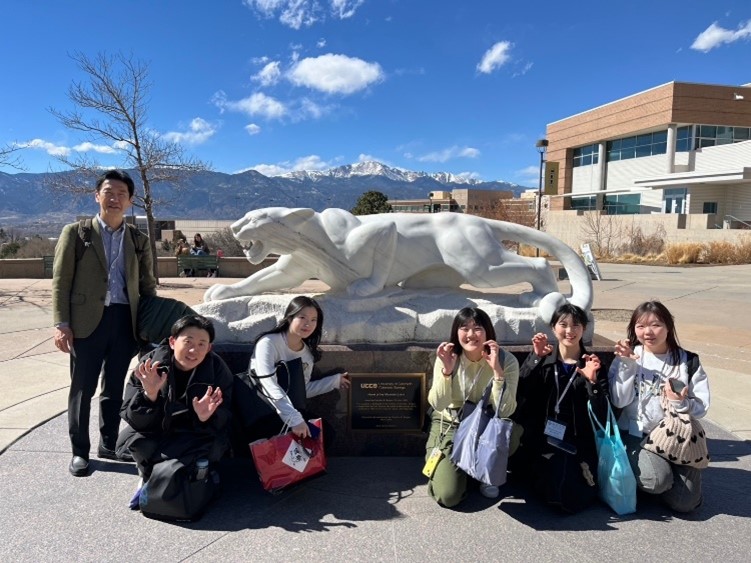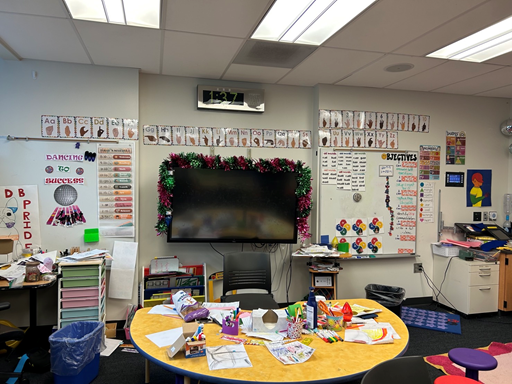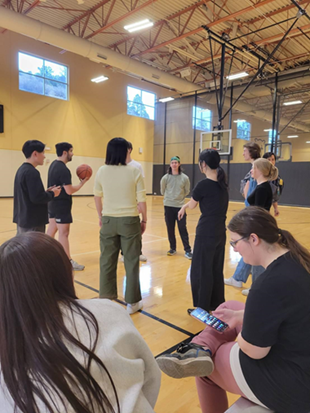School Education Collaborative Experience Program in Colorado Springs
This experience definitely gave me valuable insights for my career path

地元の人との交流について印象に残ったことは?
How was your experience interacting with local people?
One thing that really stood out to me was how often I ended up using Japanese during the program—much more than I had expected. Before the trip, we were told that we would be interacting with students from the Japanese Club and Japanese language classes, but I was surprised by how many of them there were, especially since the students were divided into beginner, intermediate, and advanced levels.
We spent a lot of time together during meals and sightseeing, and I met all kinds of students—some I saw again and again, and others I only met once. I really felt the diversity of people and experiences through those interactions.
At my university in Japan, I took a class called “Globalization and School Education”, where we learned about “Yasashii Nihongo” (simple Japanese), so I expected most students to be at that level. But I was surprised to see that many of them were actually studying more difficult kanji.
One student told me that when they learn kanji compounds, knowing the meaning of each individual kanji helps them guess the meaning and remember it better. As a native speaker, I found that really impressive—and it made me reflect on how I take kanji for granted.
In one of the education classes at UCCS, students asked me things like “How do you say this in Japanese?” and when I answered, they happily turned to their friends and said, “I just studied Japanese!” It was so nice to see their excitement.
Even in a class called Teaching Reading and Writing, which was about how to teach English to young children, a student who wasn’t studying Japanese came up to talk to me. That made me realize how much interest there is in Japan.
Also, during school visits, I saw anime characters drawn on whiteboards, Japanese goods displayed in classrooms as part of teachers’ hobbies, and manga being heavily promoted in the school library. It really made me feel how influential Japanese culture is overseas.
プログラム期間中の活動で特に印象に残ったこと
Please write about what left a strong impression on you during the program period.
The activities that left the biggest impression on me were the Welcome Breakfast and the elementary school visit. Since they were the very first things we did after arriving and going to the school, I was super nervous at first. But I was also really happy to reunite with some of the local students who had visited Japan in a previous program.
It was a special day because I got to have some great conversations with professors there, observe actual elementary school classes, and learn about the education system—all of which were really valuable experiences.
Out of everything, the elementary school visit stood out the most to me because I’m aiming to become an elementary school teacher. It was so interesting and fun to see how different things were from Japanese schools—like the age of the students, the way the desks were arranged in the classroom, and how the learning environment was set up in general. Everything felt new and fresh to me.
プログラム中の経験で将来のキャリアのために役立つと思うこと
What was a useful experience for your future career among your experiences during the program?
By visiting different types of schools and taking part in university lectures and discussions, I was able to learn a lot about the unique features of various education systems. I think these experiences will be really helpful for my future career.
Through the school visits and academic sessions, I got to learn about the differences between Japanese and American public education systems—such as the emphasis on communication-based learning and the value placed on “choice” in education. It was interesting to see how education varies between the two countries in so many ways.
I also discovered a lot of creative teaching ideas and classroom practices—like the types of activities used in lessons, teaching approaches, and how classrooms are set up. These are things I would love to try out during my teaching practicum and in my future as a teacher. This experience definitely gave me valuable insights for my career path.
次年度以降、同じプログラムに参加する学生に伝えたいこと
Comments for students who will participate in the same program next year.
I think it’s really helpful to not only rely on what you’ve learned in university classes, but also to do some independent research on topics you’re personally interested in before joining the program. By learning more about Japanese education in advance, you can deepen your understanding and get even more out of the experience.
Being able to compare what you already know with what you learn during the program helps you make deeper connections and gain a better understanding overall.
Also, if you prepare in advance to talk about your own experiences related to Japanese education, it’ll be easier to take part in discussions with professors, teachers, and local students who are studying education.
渡航前・渡航後のCOILを含め、プログラム全体を通しての感想
Feedback on the program, including COILs before and after trips to the US/Japan.
Before going abroad, we had COIL sessions, and I realized that I couldn’t speak English as well as I had expected. It made me feel nervous and unsure about joining the program. But once I got there, everything was new and exciting, and I started to enjoy the experience. Being in that kind of environment really motivated me to actively participate and try to learn as much as I could.
In a few months, the students and professors who took care of us in the U.S. will be coming to Kanazawa. I want to prepare well with the other students so we can give them an even warmer welcome in return for everything they did for us.
-

a kindergarten room in a special needs school for blind and deaf children

We played basketball and volleyball because the students from Kanazawa University wanted to
